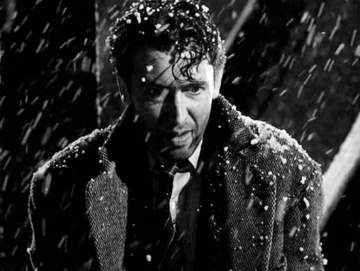by David Kordahl

In the fallow days of late December, I watched many holiday movies with my kids. The choices weren’t adventurous: Rudolph, Elf, The Polar Express. Between viewings of Home Alone, Home Alone 2: Lost in New York, and Home Alone 3, The Grinch played no fewer than eight times. My daughters capitalized on their parents’ exhaustion. Their baby brother had just come home from the hospital, and this was turning out better than we’d warned—less screaming, more TV.
But even on vacation there are limits. Instead of Home Alone 4, I insisted we watch an old gem, a movie I remembered fondly from childhood. Everyone loves It’s a Wonderful Life, I declared. It’s a real Christmas classic.
You can probably guess where this is going. Did my daughters (aged five and eight) love It’s a Wonderful Life? They tolerated it. But I felt amazed by what I saw, wrung out, on the verge of tears for the whole last hour.
It’s a Wonderful Life (which, as every appreciation notes three paragraphs in, you should really watch if you haven’t) is a fantasy about contingency. The story is wrapped in holiday gauze and told through intricate flashbacks, but at its heart is George Bailey, played by Jimmy Stewart in his everyman mode. By the film’s third act, George wants to jump off a bridge and end it all. To stop him, a guardian angel shows him how horrible his town, Bedford Falls, would be if he had never been born. This vision causes George to realize his mistake. He returns to the bridge and prays, “Please, God, I want to live again!” And—poof!—back to the real world. In the end, George reunites with his wife and children, surrounded by friends who have rallied to his aid.
Why does a movie like that work? The brief description sounds like inspirational bunk, and many appreciations—including a surprising number praising the film’s depiction of fractional reserve banking—fail to capture what’s most effective about it. For me, what makes the film work is that when George reaches the bridge, we’re there too. We understand why he wants to jump.
George Bailey’s life is not the life he wanted. Read more »

